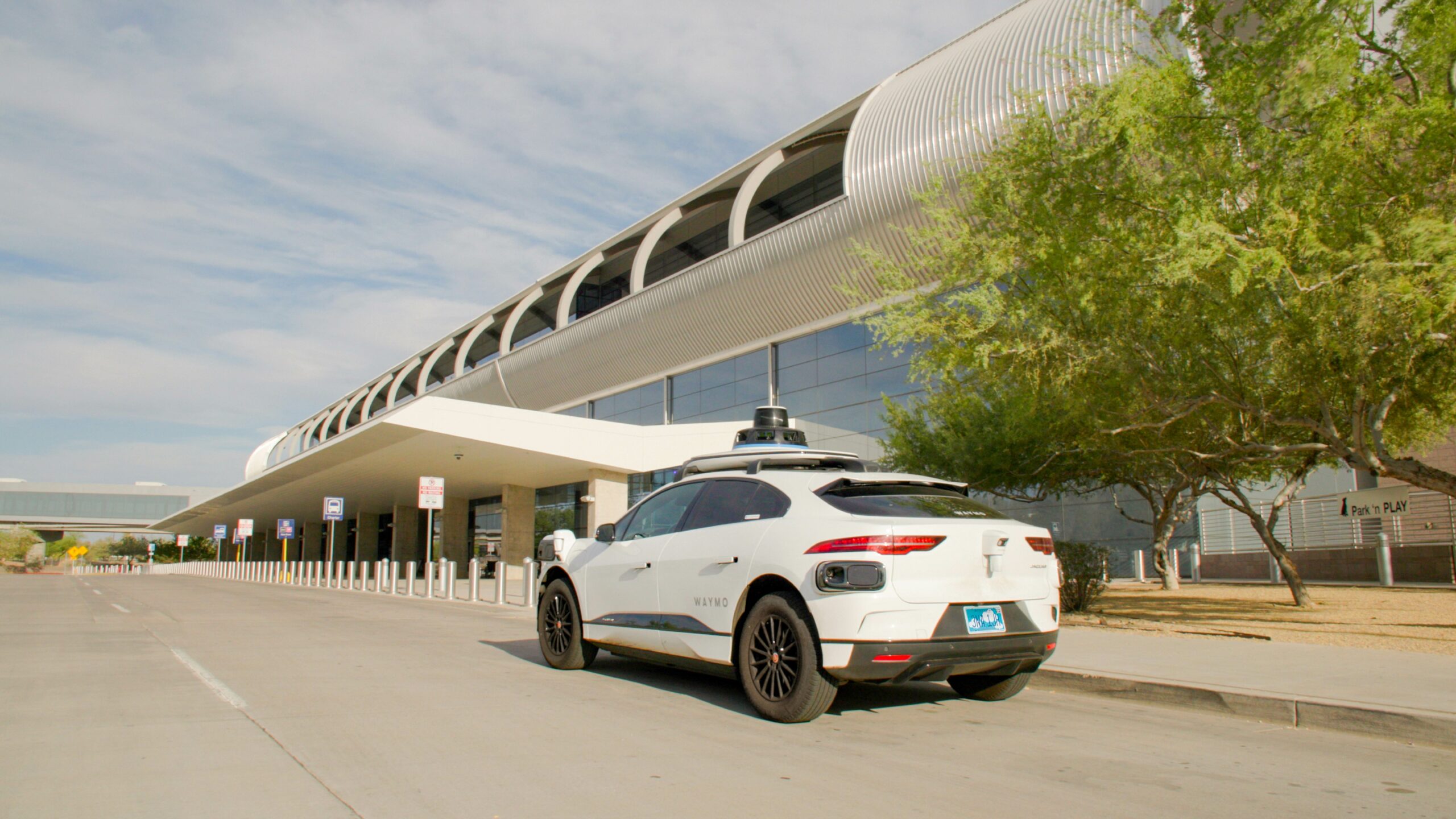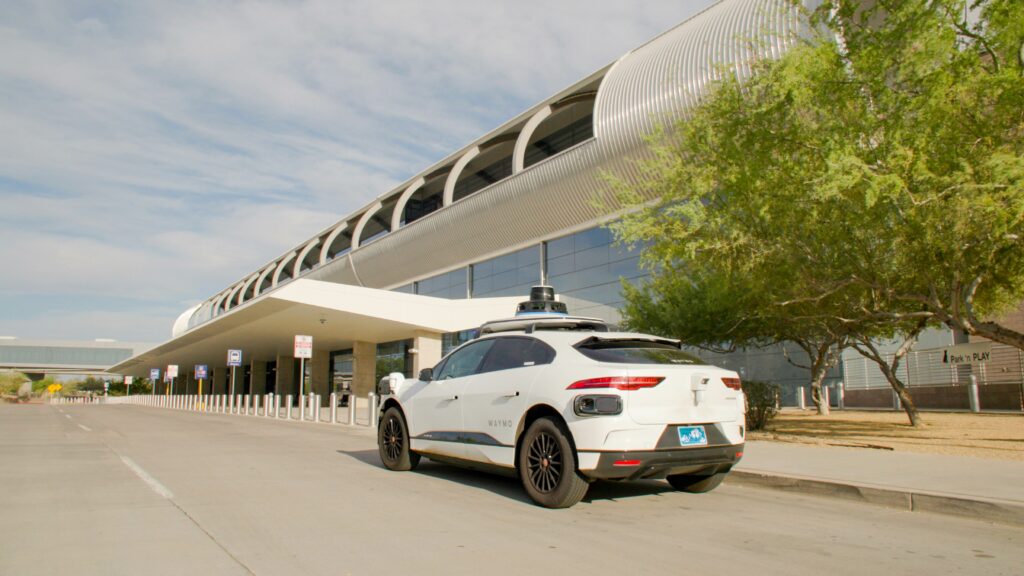
12 reasons why the airline, hotel, experiences & travel retail sectors should care about autonomous vehicles
November 21st, 2022
by Alex Bainbridge
Last week was a big week for autonomous vehicles. Alphabet’s Waymo (Google) showed off their new vehicle for the first time at a Los Angeles launch event. To recap, this is the vehicle that they will use to operate consumer mobility, including sightseeing & airport transfers.
This tech is here, this tech is scaling, but within the travel industry, we seem to be mostly ignoring the impact when faced with 101 post pandemic and pre recession challenges.
Time for a recap as to why this matters to airlines, hotels, the experiences sector and retailers / online travel agents:
Airlines & airports
1 – When autonomous vehicles are combined with eVTOL, we will likely see a shift from large hub airports to smaller local vertiports connected to smaller international airports. e.g. no more long standing jokes about Ryanair landing 50 miles outside of a city, that be will be perfectly fine when eVTOL & autonomous vehicles handle the last 50 miles to the hotel.
2 – Airport transfers will be disrupted. Waymo (Google) is already testing airport transfers at Phoenix Airport (available to the public in their beta test programme – the group they refer to as Trusted Testers).
Airports will need to consider how to architect the pickup/dropoff zones to handle that travellers will be using robotaxis rather than human drivers. For example where will the robotaxis wait? As they don’t have human drivers, they don’t have to wait exactly nearby, and need no special facilities (beyond basic security).
3 – Autonomous vehicles are likely to be designed & marketed as a short haul flight replacement. e.g. Gen.Travel from Volkswagen has been specifically designed as a concept car with this ambition. This isn’t going to happen anytime soon, but over the next decade, absolutely expect the automotive industry to have more tries at removing the need for a flight at all:
Hotels
4 – With improved mobility from shared autonomous vehicles (such as robotaxis), expect hotel location to become less important than it is today. As location is currently one of the most important (consumer) factors when selecting a hotel, any change to how important consumers regard location could have far reaching impacts.
5 – Hotels can use autonomous vehicles to extend the brand experience into the city. E.g. Accor is already looking at various ideas (at the concept stage), including enabling busy executives to squeeze in their 30 minutes of daily exercise while travelling between airport and hotel:
Not sure about that myself, however it is certainly a concept worth investigating.
My own platform (Autoura) is also working on this “extend the brand experience” objective for the hospitality industry….. for example we are working on using robotaxis for “hotel branded nights out” – e.g. hotel > restaurant > event (private / theatre / music gig etc) > late night bar (not mandatory) > hotel, all operated in the hotels own brand.
6 – Architectural adjustments – more pickup/setdown areas, less hotel guest car parking
Experiences
7 – New experiences enabled by autonomous vehicles come in at a lower price point for perhaps a similar or even better customer experience vs todays shared tour bus options. I published a video about this previously:
8 – The enablers of these new experiences are now Amazon (Zoox) and Alphabet/Google (Waymo). This has the high chance of turning the sightseeing industry upside down. These larger digital players are what we expect at the start of the consumer discovery phase, referring people to products & services in return for advertising revenue, rather than acting as the product provider themselves. Going to get messy!
9 – After the initial robotaxi scaleup phase, when it is possible to buy privately owned autonomous vehicles (assume coming after 2027 at the earliest), the sector disruption picks up a gear. (Editors note – electric vehicles don’t have gears). When vehicles are more readily available for personal ownership, they also become more readily available for local businesses to own.
At that stage a tourist will be able to hire an autonomous vehicle for 4 hours from the local car hire company (or their hotel). No robotaxis, no tour buses. The sightseeing industry should be relieved that Tesla hasn’t completely delivered on their “Full Self Driving” mission as when they or a personally owned autonomous vehicle competitor does, this will be an accelerant for the transition to digital tour operating. Luckily we get a few years to prepare for that inevitable moment, using robotaxis. Don’t squander this window 🙂
Retailers & online travel agents
10 – The majority of these experiences are free (beyond the cost of hiring the vehicle). What business model can retailers use to promote free experiences? Google Things to Do handles this well, sightseeing retailers do not.
11 – Opportunity to use these vehicles to operate branded experiences, indeed may be the only scalable way to do so. The key is not to think about the brand as a big brand (e.g. Manchester United or similar), but the brand could be a local attraction operating experiences incorporating tickets to their venue. Or it could be an outbound travel agent (e.g. a travel agent in the UK) incorporating experiences in San Francisco operated in the travel agency brand. This is something that is enabled through digital tour operating where brands can be changed instantly.
12 – There is a large technology transition required to become a Digital Experience Platform rather than an online travel agent. Only a few incumbent players will make the cut as the tech burden is high. And they have to compete with me (!)
Summary
There are different impacts for each sub-sector of the travel & hospitality industry, and it crosses both leisure and business travel (and local leisure if that market is important to you). This is not surprising as autonomous vehicles are a core level infrastructure innovation, on which new sector specific innovations are built, rather than something inherently exciting for business or leisure consumers. Autonomous vehicles are the glue, not the experience itself.
Will impact experiences first as robotaxis can be used for operating a new style of in destination experience. However OTAs, hotels & airlines tend to plan over a longer timeframe than the experiences sector, so there is work to be done immediately, for those sectors too.
My overriding call to the travel industry is now is the time to get on the field of play. It is going to be difficult, it’s going to be expensive, there are issues we haven’t yet uncovered, but the travel industry doesn’t learn anything by sitting around watching the automotive industry and significant digital entities like Google, Amazon & Apple take the lead on this.
ps – bonus video (as this article doesn’t have sufficient videos yet). How one tourist on a recent short city break to San Francisco contextualised taking a robotaxi experience within their sightseeing itinerary.
Image: Waymo

This content is protected by copyright. Link sharing is encouraged but duplication and redistribution is illegal


If you prefer to comment on LinkedIn, here is the thread https://www.linkedin.com/posts/alexbainbridge_12-reasons-why-the-airline-hotel-experiences-activity-7000422621385256961-3ycm